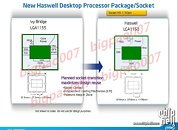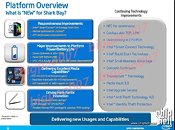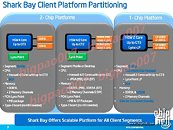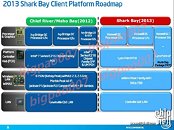Wednesday, November 9th 2011

All's Well That Haswell?
Here are the first slides detailing Haswell, Intel's next generation processor architecture that succeeds Sandy Bridge and Ivy Bridge. Intel follows a "tick-tock" product development model. Every year, Intel's product lineup sees either of the two. A "tock" brings in a new x86 architecture, a "tick" miniaturizes it to a newer silicon fabrication process. For example, Sandy Bridge is Intel's latest architecture, and is based on the 32 nm fab process. Ivy Bridge is a miniaturization of Sandy Bridge to 22 nm. Likewise, Haswell will be a brand new architecture, it will use the 22 nm fab process cemented by Ivy Bridge.
If all goes well with Intel's 22 nm process, Haswell is scheduled for Q2 2013. 2012 (Q2 onwards) will be led by Ivy Bridge. But then here's a "shocker": Haswell's desktop version will use a brand new socket, LGA1150, and will be incompatible with LGA1155. This is because of drastic changes in the pin map of the package. Sandy Bridge and Ivy Bridge share the LGA1155 socket, and will hence, have kept the socket alive for over 2 years. A major change with the component arrangement in the platform that is affecting Haswell's pin map is that Haswell will have a higher bandwidth chipset bus, rearranged PCIe pins (with FDI pins), rearranged power pins, and miscellaneous pins. It does away with a separate power domain for the integrated graphics controller.Haswell will bring several new features to the table, including next-generation RapidStart quick boot capabilities that reduce cold-boot times to 2 seconds. The processor's IPC will be increased over Ivy Bridge. The mobile version will include features that will further increase battery life of mainstream notebooks. Haswell will feature improved media HD to HD transcoding capabilities. It will bring technologies such as NFC (near-field communication), and Thunderbolt (10 Gbps interconnect) to the masses.
Moving on to the platform itself, it is named "Shark Bay", and will be available in 2-chip quad-core and 1-chip dual-core variants. The quad-core chips and some dual-core chips will use the usual socketed motherboards with a single-chip chipset (PCH) which is smaller than today's PCH chips, while the some dual-core chips will completely integrate the PCH into the processor's package, eliminating an external chipset. The dual-core chips will be available in BGA packages.
Source:
ChipHell
If all goes well with Intel's 22 nm process, Haswell is scheduled for Q2 2013. 2012 (Q2 onwards) will be led by Ivy Bridge. But then here's a "shocker": Haswell's desktop version will use a brand new socket, LGA1150, and will be incompatible with LGA1155. This is because of drastic changes in the pin map of the package. Sandy Bridge and Ivy Bridge share the LGA1155 socket, and will hence, have kept the socket alive for over 2 years. A major change with the component arrangement in the platform that is affecting Haswell's pin map is that Haswell will have a higher bandwidth chipset bus, rearranged PCIe pins (with FDI pins), rearranged power pins, and miscellaneous pins. It does away with a separate power domain for the integrated graphics controller.Haswell will bring several new features to the table, including next-generation RapidStart quick boot capabilities that reduce cold-boot times to 2 seconds. The processor's IPC will be increased over Ivy Bridge. The mobile version will include features that will further increase battery life of mainstream notebooks. Haswell will feature improved media HD to HD transcoding capabilities. It will bring technologies such as NFC (near-field communication), and Thunderbolt (10 Gbps interconnect) to the masses.
Moving on to the platform itself, it is named "Shark Bay", and will be available in 2-chip quad-core and 1-chip dual-core variants. The quad-core chips and some dual-core chips will use the usual socketed motherboards with a single-chip chipset (PCH) which is smaller than today's PCH chips, while the some dual-core chips will completely integrate the PCH into the processor's package, eliminating an external chipset. The dual-core chips will be available in BGA packages.





69 Comments on All's Well That Haswell?
So if you look a the i7-3820 with a clock speed of 3.6GHz, or a multiplier of 36. Lets say I'm aiming for 4.0GHz. I have to raise the BCLK, so I bump it to the next available option of 125. That puts it at 4.5GHz, so then you have to lower the multiplier to 32, which gives you 4.0GHz. Now of course, overclocking isn't a matter of just picking a target, I'm just giving how you get to a certain clock. Where this system becomes a hassle is when you are trying to find your max overclock. Instead of just raising one figure(be it multiplier or BCLK) you now have to fool around with balancing two to find the clock that works best for you.
It only has to be 10-15% faster than socket 1155 to be a success and for enthusiasts to choose socket 2011 over socket 1155.
Anything over 15% performance will be a bonus and they will sell like hotcakes to the enthusiast crowd.
The platform is coming out next week so how about we wait for benchmarks before writing off the platform?
www.guru3d.com/article/sandy-bridge-e-and-x79-preview/
Intel does want you to buy a new motherboard every two years.
But that is Intel's strategy, and I like it. They aren't holding back designs and sacrificing performance to maintain compatibility. They just go balls out, design a processor the way they want, then design the platform around it. That is why people with 1366 have been able to keep their platforms for 3 years now, and can continue to use their platforms for at least another year. And AMD has yet to really even catch up to 1366. So you keep being not impressed with Intel, I'm quite impressed with the fact that a platform they put out over 3 years ago is still outperforming AMD's platform released a few weeks ago. I'm not impressed with AMD, but plenty impressed with Intel.
For my Brothers machine which has an AsRock 970 Extreme 4 with a Phenom II X2 555 BE with 8 gigs Ripjaws 8CL and 6770 Vid Card. Windows 7 HP 64 (CPU Unlocked to the X4 B55/955 BE Status) it Performs effin fast already (Built in August/September). I will drop in the Fastest and final AM3+ CPU Produced and then max the ram out after upgrading 7 to Pro, then he probably wont have another upgrade till say 7-10 years down the road. this was going from an Old P4 2.4Ghz machine
As I said, Intel users with 1366, or even 1156, are set for just as long as a AM3+ user.
If AMD really wanted to maintain compatibility, if it was really a concern of theirs, they would have left the DDR controller on the Athlon 64 architecture and just added a DDR2 controller for AM2 sockets and keep support for 939. AMD only uses the compatibility thing because they have to because they are behind on performance. If they were ahead, they'd be changing out sockets like crazy, just like they did when they were ahead.